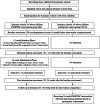A school-family blended multi-component physical activity program for Fundamental Motor Skills Promotion Program for Obese Children (FMSPPOC): protocol for a cluster randomized controlled trial
- PMID: 36803486
- PMCID: PMC9942318
- DOI: 10.1186/s12889-023-15210-z
A school-family blended multi-component physical activity program for Fundamental Motor Skills Promotion Program for Obese Children (FMSPPOC): protocol for a cluster randomized controlled trial
Abstract
Background: Fundamental motor skills (FMSs) are crucial for children's health and comprehensive development. Obese children often encounter a considerable challenge in the development of FMSs. School-family blended PA programs are considered a potentially effective approach to improve FMSs and health-related outcomes among obese children, however, empirical evidence is still limited. Therefore, this paper aims to describe the development, implementation, and evaluation of a 24-week school-family blended multi-component PA intervention program for promoting FMSs and health among Chinese obese children, namely the Fundamental Motor Skills Promotion Program for Obese Children (FMSPPOC) employing behavioral change techniques (BCTs) and building on the Multi-Process Action Control (M-PAC) framework as well as using the Reach, Effectiveness, Adoption, Implementation, and Maintenance (RE-AIM) framework for improving and evaluating the program.
Methods: Using a cluster randomized controlled trial (CRCT), 168 Chinese obese children (8-12 years) from 24 classes of six primary schools will be recruited and randomly assigned to one of two groups by a cluster randomization, including a 24-week FMSPPOC intervention group and a non-treatment waiting-list control group. The FMSPPOC program includes a 12-week initiation phase and a 12-week maintenance phase. School-based PA training sessions (2 sessions/week, 90 min each session) and family-based PA assignments (at least three times per week, 30 min each time) will be implemented in the initiation phase (semester time), while three 60-min offline workshops and three 60-min online webinars will be conducted in the maintenance phase (summer holiday). The implementation evaluation will be undertaken according to the RE-AIM framework. For intervention effectiveness evaluation, primary outcome (FMSs: gross motor skills, manual dexterity and balance) and secondary outcomes (health behaviors, physical fitness, perceived motor competence, perceived well-being, M-PAC components, anthropometric and body composition measures) will be collected at four time-points: at baseline, 12-week mid-intervention, 24-week post-intervention, and 6-month follow-up occasions.
Discussion: The FMSPPOC program will provide new insights into the design, implementation, and evaluation of FMSs promotion among obese children. The research findings will also supplement empirical evidence, understanding of potential mechanisms, and practical experience for future research, health services, and policymaking.
Trial registration: Chinese Clinical Trial Registry; ChiCTR2200066143; 25 Nov 2022.
Keywords: Behavioral change techniques (BCT); Blended intervention; Children; Fundamental motor skill; Health; Implementation science; Obesity; Physical activity; RE-AIM.
© 2023. The Author(s).
Conflict of interest statement
The authors declare that they have no conflicts of interests.
Figures
References
-
- Gallahue DL, Ozmun JC, Goodway J. Understanding motor development: Infants, children, adolescents, adults. 7. New York, NY: McGraw-Hill; 2012.
Publication types
MeSH terms
LinkOut - more resources
Full Text Sources
Medical



